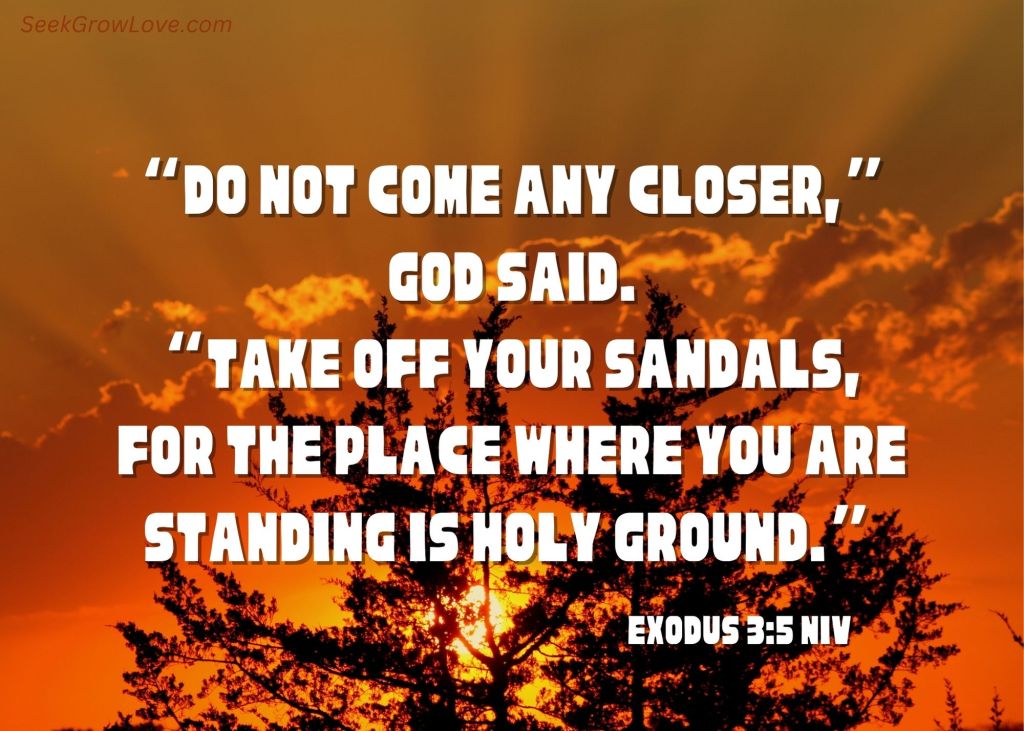
Old Testament Reading: Exodus 3 & 4
Psalms Reading: Psalm 30
New Testament Reading: Romans Introduction Below
These words in Exodus 3:5 always give me pause:
5 “Do not come any closer,” God said. “Take off your sandals, for the place where you are standing is holy ground.” (NIV)
In this situation, Moses saw a burning bush that was not being consumed by the fire and walked over to investigate it. He hears God’s voice from within the bush and approaches it, but God reminds Him of some important boundaries and guidelines (don’t come any closer, take off your sandals, remember this is holy ground). In verse 6 we read,
6 Then he said, “I am the God of your father, the God of Abraham, the God of Isaac and the God of Jacob.” At this, Moses hid his face, because he was afraid to look at God. (NIV)
If you stop here, you would think Moses gets it. He recognizes he is hearing from God Almighty. Yet, somehow, it doesn’t seem to completely sink in for him. I say that because Moses proceeds to pepper his conversation with God with all kinds of doubt and questioning.
God acknowledges that he has seen the suffering of His people and shares His plan with Moses in verse 10:
10 So now, go. I am sending you to Pharaoh to bring my people the Israelites out of Egypt.” (NIV)
Moses has the audacity to question God.
11 But Moses said to God, “Who am I that I should go to Pharaoh and bring the Israelites out of Egypt?” (NIV).
As we read on, we see many instances of “But God, what about this or what about that.”
I would like to contrast this dialogue between Moses and God with David’s words of praise in Psalm 30.
1 I will exalt you, Lord,
for you lifted me out of the depths
and did not let my enemies gloat over me.
2 Lord my God, I called to you for help,
and you healed me.
3 You, Lord, brought me up from the realm of the dead;
you spared me from going down to the pit. (NIV)
David gives God the praise he is due.
-Kristy Cisneros
Reflection Questions:
- In reflecting on today’s reading, are you more like Moses or David?
- If you find that you fall into a Moses mode more often than you would like, what steps could you take to be more like David?
- There have been many different human responses to God – some good, some bad – but what do we learn about God Himself in these passages? How does having a better understanding of who God is and how He works help us have a proper response. Is there perhaps something Moses didn’t understand at the time about God?
For our New Testament reading, we will be spreading out the gospels throughout the year, and reading Acts after we read Luke, so tomorrow we will jump ahead and begin reading the book of Romans, one chapter a day. In preparation, enjoy this
Romans Introduction
I’ll start by saying that I love the book of Romans. It’s among my relatively few favorites.
Similar to the book of Exodus, the book of Romans talks about slavery. Slavery to sin, and deliverance from that slavery. The book of Exodus records God’s laws for his people; but the book of Romans shows that no-one is able to obey that law completely. And because nobody is able to follow God’s laws completely, all of us deserve to die. Fortunately, the book of Romans also gives the antidote.
In the Book of Romans, we find what some call the “Roman Road to Salvation”. There are a few variations, but it goes something like this…
- Romans 3:23, “All have sinned and fall short of the glory of GOD.”
- Do you recognize you are a sinner and have disappointed GOD?
- Romans 6:23, “The wages of sin is death, but the gift of GOD is eternal life through Jesus Christ our Lord”
- Do you recognize the punishment for sin is eternal death?
- Do you want this gift of eternal life that GOD wants to give you?
- Do you recognize the punishment for sin is eternal death?
- Romans 5:8, “but God shows his love for us in that while we were still sinners, Christ died for us.”
- Do you believe Jesus died to pay the punishment for your sins?
- Romans 10:9 says, “If you declare with your mouth, ‘Jesus is Lord,’ and believe in your heart that God raised him from the dead, you will be saved.”
- Do you believe God raised Jesus from the dead?
- Do you agree to make Jesus Lord of your life? This means living a life like he lived.
- Do you believe God raised Jesus from the dead?
- Romans 5:1 says, “Therefore, since we have been justified through faith, we have peace with God through our Lord Jesus Christ”.
- Do you have peace with God? If not, go back to step 4.
- Romans 12:1-2 describes the metamorphosis that takes place in all true believers, “Therefore, I urge you, brothers and sisters, in view of God’s mercy, to offer your bodies as a living sacrifice, holy and pleasing to God—this is your true and proper worship. Do not conform to the pattern of this world, but be transformed by the renewing of your mind. Then you will be able to test and approve what God’s will is—his good, pleasing and perfect will.”
- Does this accurately describe you? If not, go back to step 4.
-Steve Mattison

